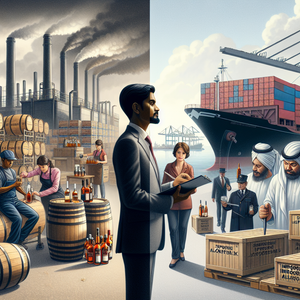
Navigating Tariffs in the Printing Industry: Challenges, Adaptations, and Emerging Career Opportunities
The printing and publishing industry is being reshaped by the ripple effects of tariffs on imported materials. From soaring costs for paper, ink, and aluminum printing plates to disruptions in supply chains, the industry faces a new set of challenges. Smaller publishers, in particular, are feeling the pinch, with higher production costs and shrinking profit margins. However, with these challenges come opportunities for innovation, adaptation, and the emergence of new professional roles.
Job Summaries:
The Impact of Tariffs: Disruption and Transformation:
- Tariffs on materials like paper, aluminum, and printing plates have increased production costs, with paper costs rising by 15%-20%.
- Smaller publishers struggle to absorb these costs, leading to higher consumer prices.
- Companies are adapting by sourcing materials domestically, investing in digital printing, and prioritizing sustainability.
- These changes create demand for professionals skilled in logistics, sustainability, and digital production.
Emerging Roles and Opportunities in the Printing Industry:
- The industry is witnessing the rise of key roles due to tariff-driven changes.
- These include Supply Chain Managers, Digital Printing Specialists, Trade Compliance Officers, Procurement Specialists, Sustainability Officers, Tariff Analysts, Logistics Coordinators, Printing Operations Managers, and Customs Brokers.
- Each role addresses specific challenges such as disrupted supply chains, cost management, and sustainability.
Supply Chain Manager:
- Supply Chain Managers are critical for navigating disrupted supply chains.
- They identify alternative suppliers, negotiate costs, and develop contingency plans.
- Key skills include expertise in international trade regulations, cost optimization, and problem-solving.
Digital Printing Specialist:
- Digital Printing Specialists are in demand as companies transition to digital printing to reduce costs and waste.
- They operate and maintain equipment, troubleshoot issues, and ensure quality outputs.
- Skills include proficiency in digital printing software and graphic design.
Trade Compliance Officer:
- Trade Compliance Officers ensure adherence to trade regulations, avoiding fines and delays.
- They identify tariff exemptions and alternative trade routes.
- Skills required include knowledge of customs regulations, international business, and law.
Procurement Specialist:
- Procurement Specialists source materials at competitive rates while maintaining quality.
- They negotiate contracts and explore sustainable options like recycled paper.
- Skills include vendor management, negotiation, and business administration.
Sustainability Officer:
- Sustainability Officers implement eco-friendly solutions to address financial and environmental challenges.
- They focus on recycled materials and energy-efficient technologies.
- Skills include knowledge of sustainability practices and environmental science.
Tariff Analyst:
- Tariff Analysts evaluate trade policies' financial impact and recommend cost-minimizing strategies.
- They analyze policy changes and suggest solutions like relocating production.
- Skills include data analytics, economics, and forecasting.
Logistics Coordinator:
- Logistics Coordinators manage transportation routes and regulatory paperwork to ensure timely delivery of goods.
- Skills include organizational abilities, communication, and logistics management.
Printing Operations Manager:
- Printing Operations Managers oversee production schedules, budgets, and quality control.
- They implement strategies like digital printing to counteract rising costs.
- Skills include leadership, project management, and production expertise.
Customs Broker:
- Customs Brokers handle complex regulations and paperwork for smooth cross-border goods movement.
- They prevent delays and penalties.
- Skills include certification as a customs broker and knowledge of international trade laws.
The imposition of tariffs has undoubtedly disrupted the printing and publishing industry, but it has also prompted innovation and the emergence of new professional opportunities. From digital printing specialists to sustainability officers, a variety of roles are helping companies adapt to these challenges while positioning themselves for future success. For professionals, the key to thriving in this evolving landscape lies in developing specialized skills and staying informed about industry trends. By embracing change and seeking out opportunities for growth, both individuals and companies can turn challenges into advantages, ensuring long-term resilience in a competitive market.
Explore More Jobs

